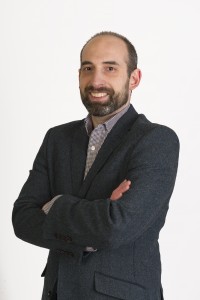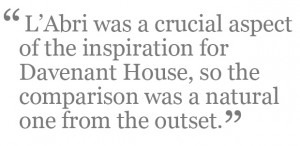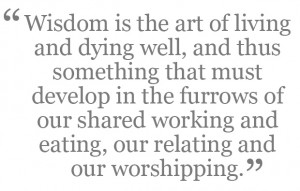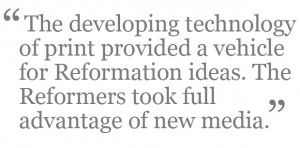
I’ve long been intrigued by the idea of a place where Christians can go to deepen their understanding of the faith together outside of an academic setting. I pictured a place that felt more like a home than a seminary–a place focused on conversations outside of classrooms–where work and worship are as integral to the daily routine as theology. The mountains always seemed like the natural setting, perhaps because of Christ’s self-revelation on mountaintops throughout the gospels, and perhaps because Francis Schaeffer’s L’Abri has always held a quasi-legendary place in my imagination. Working with the Colson Center for Christian Worldview, I can, of course, recommend the Colson Fellows, a year-long entrepreneurial discipleship program that stands in the tradition of Schaeffer and employs a “mere Christian” curriculum.
But with the Reformation nearing its five hundredth year, there’s a pressing concern for those who share my specific convictions: Protestantism is no longer known for its intellectual rigor, and easy answers have become all-too-common from evangelical teachers. As we approach the historic anniversary of Martin Luther’s call to reform the Church, many are openly asking whether Protestant Christianity remains a viable option for believers serious about the life of the mind.
A cohort of young men who share these concerns and this dream have spent the last several years on a project they believe can begin to offer an answer. The Davenant Trust, an organization dedicated to recovering Protestant wisdom, recently opened a house in the foothills of South Carolina’s Blue Ridge Mountains where they hold a series of summer programs designed to do pretty much what I had dreamed about. My friend and Davenant Trust president, Dr. Brad Littlejohn, tells me that students live, work, eat, pray, read, and converse together, following the philosophy that Socratic learning around food and drink can often have a more lasting impact than a classroom. This year’s programs will be led by Dr. Alastair Roberts, whom I had the pleasure of interviewing. Here is that exchange, in full.
-What is the Davenant Trust? When and how did it get started, and what is its mission?

The Davenant Trust (mission statement) is a non-profit organization founded to support the renewal of Christian wisdom for the contemporary church. We seek to sponsor historical scholarship at the intersection of the church and academy, build networks of friendship and collaboration within the Reformed and evangelical world, and equip the saints with time-tested resources for faithful public witness.
The idea of the Davenant Trust first germinated in the spring of 2013; the Trust was incorporated in September of the same year. It has pursued its mission on a number of fronts. It fosters networks through an annual convivium for pastors, scholars, and interested laypersons, and through various regional meetings during the year. It encourages the advancement of momentous conversations for the Church through its publications and through helping to organize public events, such as the ‘Future of Protestantism’ event at Biola University a few years ago. It pursues the recovery of Protestant wisdom through sponsoring translation work and, more recently, through its work in producing a modernized version of Richard Hooker’s work. It also produces Ad Fontes, a monthly publication, and the fortnightly Common Places podcast.
Alongside these activities, the Davenant Trust also has a Latin Institute, which offers online courses in theological Latin. These courses equip students with the skills that will enable them to explore and recover the rich, yet sadly neglected, veins of Protestant wisdom in works that have yet to be translated into English. Last year, the Trust established a residential study centre, Davenant House.
The Davenant Trust is committed to Protestant ressourcement, retrieving the breadth and the depth of a tradition whose scope has often been underappreciated. The term ‘Calvinist’ often functions as a partisan shibboleth, denoting something such as the supposed ‘five points’ of a Reformed system of theology, a system that often both badly caricatures and is abstracted from the more comprehensive vision and example of the Reformer. Our hope, by contrast, is to recover a robust Reformed irenicism, which emulates and builds upon the wisdom of the Reformers and of the tradition that followed them. Although Calvin may be the brightest luminary in the Reformed constellation as it appears from our position in history, we wish to situate Calvin’s theology in relation to other significant figures (such as Richard Hooker), whose presence alongside Calvin in the wider world of the Reformation tradition serve to clarify what Calvin himself represents.
All of this entails a close, patient, and extensive attention to historical sources, not merely to secondary and derivative sources. We wish to follow the best of the Reformed tradition in a commitment to charity, rigour, care, irenicism, and clarity in scholarship.
-What’s with the name? Explain a little about Davenant. Who is he? Why did you pick him as your group’s namesake?
The Trust is actually named after John Davenant, a 17th-century bishop of Salisbury and one of the British delegates at Dort. Davenant exemplifies the sort of theology that we are seeking to recover: a theology characterized by wisdom, erudition, and clarity, by which differences can be accurately situated and broken down to size. As the president of the Davenant Trust, Brad Littlejohn, has argued, we often mistakenly pursue peace through obfuscation and calculated vagueness. However, a figure such as Davenant shows the power of precision and care in the pursuit of reconciliation and healthy disagreement.
-When did the idea of Davenant House strike? Could you tell me a little about what led to choosing and obtaining the property? Did anyone make the Francis Schaeffer/L’Abri comparison?
The idea of Davenant House first came early in June 2015, before the third of the annual convivia, all of which had been held in what was then called Laureldale Cottage. The property was going up for sale and, as Brad and others were brainstorming to determine places for future convivial, it become clear that the cottage was ideally situated. As the Davenant Trust was looking for places suitable for residential courses, purchasing such a property made a lot of sense. Jake Meador, the vice-president of  the Trust, felt a calling to pursue L’Abri style ministry, having had extensive experience in L’Abri centres previously. In light of these considerations, the founding of the Davenant House was a very natural development, especially as the Trust’s board were enthusiastic about the project and the funds were readily raised.
the Trust, felt a calling to pursue L’Abri style ministry, having had extensive experience in L’Abri centres previously. In light of these considerations, the founding of the Davenant House was a very natural development, especially as the Trust’s board were enthusiastic about the project and the funds were readily raised.
L’Abri was a crucial aspect of the inspiration for Davenant House, so the comparison was a natural one from the outset. Although Davenant House is not a clone of L’Abri, it aspires to many of the virtues and strengths exemplified in the ministry of L’Abri. Likewise, Francis Schaeffer’s sense of the need for deeper and broader Christian engagement with culture, history, and human persons is a conviction that we share.
-How does the work of Davenant and the House differ most dramatically from more structured/institutional programs? Jake mentioned the concept of “making disciples around beer, food, and fellowship”–a more Socratic mode of instruction than is offered elsewhere. Tell me a little about that.
 At the heart of the work of Davenant House is a commitment to the recovery and inculcation of Christian wisdom. This wisdom is more than merely a set of ideas in the head: it is the attuning of the person to created reality and their place within it, integrating heart, action, and mind in the love and service of God. It is about growth into truthful forms of life. Too often, Christian teaching can inform the mind in detachment from the life. Sometimes it can be akin to a medicine cabinet, simply teaching Christians which medicine to reach for when they encounter a particular philosophy or system of thought. However, you can’t produce true health by raising people on medicine. We want to resist the dangers of such a narrowly corrective approach to Christian teaching and pursue the rich edification of wisdom.
At the heart of the work of Davenant House is a commitment to the recovery and inculcation of Christian wisdom. This wisdom is more than merely a set of ideas in the head: it is the attuning of the person to created reality and their place within it, integrating heart, action, and mind in the love and service of God. It is about growth into truthful forms of life. Too often, Christian teaching can inform the mind in detachment from the life. Sometimes it can be akin to a medicine cabinet, simply teaching Christians which medicine to reach for when they encounter a particular philosophy or system of thought. However, you can’t produce true health by raising people on medicine. We want to resist the dangers of such a narrowly corrective approach to Christian teaching and pursue the rich edification of wisdom.
Too often Christian teaching has become divorced from the soil of human existence, a set of ideas and beliefs that rattle around in our brains. We can be forgetful of the fact that wisdom is the art of living and dying well, and thus something that must develop in the furrows of our shared working and eating, our relating and our worshipping. It is something learned as we labour and rest together, as we assemble to proclaim God’s worth in our praise, as we learn from and with each other, men and women, old and young, and as we number our days. Davenant House provides a space where this can happen, along with the shared labour, eating, worship, and study that catalyse the process.
 The courses at Davenant House will involve substantial reading lists, offering us the opportunity to get our teeth into the study of profound Christian truths relating to a comprehensive Christian engagement with reality. These texts, on a wide range of subjects and from many different times, ancient to modern, will provide a springboard for discussion and debate. We will be thinking about the Christian imagination, about creation, Scripture, ethics, politics, history, and other matters besides. Each day will also involve work upon the land around the centre (which is beautifully situated in the foothills of the Blue Ridge mountains), time spent in prayer, worship, reading of Scripture, and eating and drinking together.
The courses at Davenant House will involve substantial reading lists, offering us the opportunity to get our teeth into the study of profound Christian truths relating to a comprehensive Christian engagement with reality. These texts, on a wide range of subjects and from many different times, ancient to modern, will provide a springboard for discussion and debate. We will be thinking about the Christian imagination, about creation, Scripture, ethics, politics, history, and other matters besides. Each day will also involve work upon the land around the centre (which is beautifully situated in the foothills of the Blue Ridge mountains), time spent in prayer, worship, reading of Scripture, and eating and drinking together.
Although the course is carefully designed—something earlier students at the house have praised—it has a degree of open-endedness to it that one might not find in other programs. We are learning with and from each other in the course of living and working together: such a program will always contain unforeseen surprises and be shaped by the backgrounds and insights that a unique combination of students brings to it. Having already seen a number of applications from prospective students for the programs this year, I am anticipating some very stimulating and rewarding interactions.
-Who is in leadership? Who has attended? What kinds of theological heft does Davenant bring to the Convivium and other get-togethers? I know Carl Trueman was at last year’s event. Any plans for other heavy-hitters?
The president of the Davenant Trust is Brad Littlejohn and the vice-president is Jake Meador. Alongside them there is a board of directors and a board of advisors.
 Plenary speakers at past convivia include Dr Carl Trueman, Dr Glenn Moots, Dr James Bratt, Dr W. J. Torrance Kirby. You can find more detailed descriptions of past convivia here. The plenary speaker this year is Dr Fred Sanders; we will be exploring the subject of teaching the doctrine of God in the life of the Church. As in the Davenant House program, one of the highlights of the Convivium is the opportunity to build friendships and to get to know the various speakers over good food and beer. The Convivium stands out from the various academic conferences I have been to in the tightness with which it integrates fellowship and scholarship, and in its connection of rigorous scholarship with the commitment and conviction that should characterize the mission of the Church. Not only are the various papers delivered deeply informative and thought-provoking, the time spent together is immensely enjoyable. I am really looking forward to returning this year.
Plenary speakers at past convivia include Dr Carl Trueman, Dr Glenn Moots, Dr James Bratt, Dr W. J. Torrance Kirby. You can find more detailed descriptions of past convivia here. The plenary speaker this year is Dr Fred Sanders; we will be exploring the subject of teaching the doctrine of God in the life of the Church. As in the Davenant House program, one of the highlights of the Convivium is the opportunity to build friendships and to get to know the various speakers over good food and beer. The Convivium stands out from the various academic conferences I have been to in the tightness with which it integrates fellowship and scholarship, and in its connection of rigorous scholarship with the commitment and conviction that should characterize the mission of the Church. Not only are the various papers delivered deeply informative and thought-provoking, the time spent together is immensely enjoyable. I am really looking forward to returning this year.
This summer, I will be guiding the studies in the two Davenant House Protestant Wisdom Summer Study Programs. The first is an intensive ten-day course, running from June 6th to the 17th and the second is a five-week course, from June 19th to July 21st.
-Jake mentioned the idea of “retrieval” as key to the mission of Davenant. And there’s a Christian humanism element going on here. What’s that about?
I have already discussed the element of retrieval and ressourcement to some extent. This task is spurred by our conviction that, in our understanding of God’s world and Word, we will be most effective as we stand within and under the guidance of a tradition of master thinkers. In order better to situate ourselves within such a tradition—a rich conversation extended through the centuries—we return to the sources and seek to recover them where they have been lost or neglected. Retrieval of tradition is especially important as a corrective in a context where, in only engaging with our contemporaries, we risk intensifying the characteristic blind spots of our own era.
We are also influenced by the tradition of Christian humanism, with its regard for reason and its attentiveness to our humanity and the divinely given order of created reality. Unless we are people who are firmly acquainted with nature and practically grounded in its reality, our theology and thinking more generally are at risk of floating above reality like oil on water. A constrained Biblicism divorced from knowledge and study of the natural world and practice of reason can also produce an approach to natural, social, and political reality that is lacking in the suppleness of prudence and wisdom.
-We’re coming up on the 500th anniversary of the Reformation. What do the Reformers have to offer Christians today? What’s missing in contemporary evangelical Christianity that we can find in Wittenberg, in Geneva, at Westminster, and so forth?
One of the areas in which we most stand to gain from the Reformers is in following their example of Christian humanism. The Protestant Reformation wasn’t a radical break with the past and the tradition of the Church, but arose out of a renewed and intensified engagement with it. The Reformers returned to the study of the Scriptures in their original languages, to the writings of the Church Fathers, to classical wisdom, and also threw themselves into the study of the world and society more generally. They rolled up the sleeves of their minds and plunged them into unreserved engagement with God’s reality. The breadth of their learning and their erudition displays a confident and full-orbed Christian posture towards reality that we should admire and emulate.
 Looking at the Reformers, one is also struck by the integration of their Christian scholarship with their pursuit of the life and health of the Church. Re-establishing this vital connection—a connection which fires our scholarship with its proper urgency, and which forms our communities and churches around the backbone of Christian truth—is imperative in our day and age. Here, again, we find worthy models in the Reformers.
Looking at the Reformers, one is also struck by the integration of their Christian scholarship with their pursuit of the life and health of the Church. Re-establishing this vital connection—a connection which fires our scholarship with its proper urgency, and which forms our communities and churches around the backbone of Christian truth—is imperative in our day and age. Here, again, we find worthy models in the Reformers.
Many have commented upon the way that the developing technology of print provided a vehicle for Reformation ideas. The Reformers took full advantage of new media and, alongside their personal scholarship, formed extensive networks, petitioned political leaders, brokered theological alliances, and sought the peace of Christ’s church and the wellbeing of his people in the truth. We currently find ourselves at a juncture in history where we also need to learn how to make the most of new media, without falling prey to their attendant vices. Like the Reformers, we face the uphill task of forging robust networks of Christian thinkers, social niches for Christian communities, irenic relations between different Christian groups, political space for Christian faithfulness, and new ecclesial organizations that are prepared to weather the storms that await us. Evangelicalism has benefited from relatively clement cultural climates for many decades, climates within which the task of institution-forming was much less demanding. The ministry of Davenant Trust is a small part of our answer to this larger task.
 Evangelicalism is often at risk of becoming a consumerist form of Christianity, formed around and principally catering to the individual and their spiritual choices and preferences. Our cultural practices and the ideology that is implicit within them are about personal choice and self-expression. As evangelical Christians we frequently frame our Christian convictions within the language and conceptual frameworks this culture affords us. Reading the Reformers, however, one is struck by the power of truth to lay claim upon the self and society and to transform both as a result. The famous answer to the first question of the Heidelberg Catechism—‘What is your only comfort in life and in death?’—captures something of the Reformation’s electrifying realization of God’s claim upon us:
Evangelicalism is often at risk of becoming a consumerist form of Christianity, formed around and principally catering to the individual and their spiritual choices and preferences. Our cultural practices and the ideology that is implicit within them are about personal choice and self-expression. As evangelical Christians we frequently frame our Christian convictions within the language and conceptual frameworks this culture affords us. Reading the Reformers, however, one is struck by the power of truth to lay claim upon the self and society and to transform both as a result. The famous answer to the first question of the Heidelberg Catechism—‘What is your only comfort in life and in death?’—captures something of the Reformation’s electrifying realization of God’s claim upon us:
That I am not my own, but belong—body and soul, in life and in death—to my faithful Savior, Jesus Christ. He has fully paid for all my sins with his precious blood, and has set me free from the tyranny of the devil. He also watches over me in such a way that not a hair can fall from my head without the will of my Father in heaven; in fact, all things must work together for my salvation. Because I belong to him, Christ, by his Holy Spirit, assures me of eternal life and makes me wholeheartedly willing and ready from now on to live for him.
-How can my readers get plugged into Davenant? Obviously, there’s only so much room at the House. Are there plans to expand? How does Davenant fit into the overall picture of King Jesus’ global conquest, and advance His work?
The Davenant Trust’s website is probably the best place to go to get a sense of the various dimensions of the work it does. There are videos in which the visions of the Trust more generally and Davenant House in particular are described. You can also find out more about regional networks and convivia on the website. You can subscribe to receive updates about the work of the Trust here.
The Davenant Trust depends upon the prayers and the generous donations of supporters like you for its continued work. If you are interested in supporting the work of the Davenant Trust, you can donate here. A particular good way in which to support—and benefit from—the work of the Davenant Trust is by becoming a trustee. Davenant Trustees can participate in communities of conversation led by Davenant scholars and have exclusive access to monthly livestreams and discussions.
There are still places available at both the more intensive and the longer Protestant Wisdom Summer Programs, which I will be leading this year. You can read more about those here, watch videos describing different dimensions of the program, and also apply to join us. Early applicants (by March 15th) for the programs will receive a 20% discount.
If we start getting maxed out on capacity for the summer study programs, we will be expanding either by adding more weeks in the summer or, hopefully, longer-term and somewhat more informal residential programs during the academic year.
The endgame is God’s, but the Davenant Trust seeks to play its part in equipping Christians with and grounding them in the wisdom with which they will be of greater service in the kingdom. Through its work, it seeks to reacquaint us with the riches of our Christian past in order better to prepare us for the future. The Davenant Trust is also about creating robust networks of Christian thinkers, workers, and students, within which we edify and challenge each other in our common service and pursuit of God’s truth. This dimension of its work has perhaps been the most enriching in my own life. As we are formed together in wisdom, we will be able to pass on what we have learned to others in our turn.
















